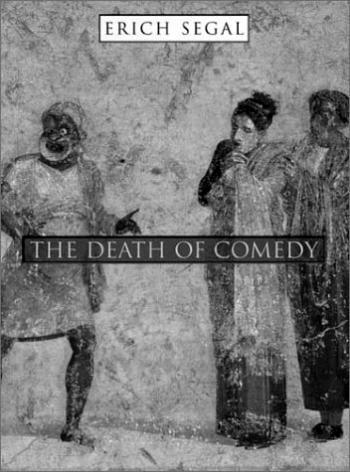
News
Progressive Labor Party Organizes Solidarity March With Harvard Yard Encampment

News
Encampment Protesters Briefly Raise 3 Palestinian Flags Over Harvard Yard

News
Mayor Wu Cancels Harvard Event After Affinity Groups Withdraw Over Emerson Encampment Police Response

News
Harvard Yard To Remain Indefinitely Closed Amid Encampment

News
HUPD Chief Says Harvard Yard Encampment is Peaceful, Defends Students’ Right to Protest
The Death of Comedy

A marked departure for the author of Love Story, the novel that inspired the movie of the same name (which is a Crimson Key favorite), Erich Segal’s The Death of Comedy traces the development of comedy through two millennia of human history.
Segal begins with an etymological analysis of the word “comedy.” After offering three definitions derived from different Greek roots, Segal combines them, finally suggesting that comedy is “a dreamsong of a revel in the country.” From there, Segal launches into a discussion of major works and playwrights in the life of comic theater. He starts with Aristophanes, whose name, for many, is “synonymous with ‘obscenity.’” The period’s comedy was characterized by disorganization in structure, bathroom humor, comic eating with sexual overtones and free use of language. Segal refers to the period of Old Comedy as an “unique confection of the lyre and the phallus, a counterpoint of melodic delicacy and discordant grossness.”
Segal then proceeds to discuss the works of Menander, Plautus, Terence, Machiavelli (yes, he of the famous political treatise) Marlowe, Shakespeare, Moliere, Ben Jonson and Shaw, along with many others. Even this light-hearted romp, though, must end. As the title of the book suggests, the book concludes on a grim note, charging that comedy perished with the advent of what Segal calls the Theater of the Absurd, which was characterized by the decay of language and theme of the meaninglessness of existence. Most of the final chapter is devoted to an analysis of Samuel Beckett’s Waiting for Godot, which, Segal argues, marked, “the end of the life cycle of genre—the death of comedy.”
With over 400 pages of text and another 100 of notes, The Death of Comedy is broad in scope but lovingly detailed. The writing, which does not assume prior knowledge of the subject, is as engaging as it is rich with allusion to sources as diverse as Freud, Wordsworth, the musical My Fair Lady and Roberto Benini’s acclaimed movie Life is Beautiful. Whether or not the reader ultimately agrees with Segal’s arguments, The Death of Comedy remains an enjoyable read, a sweeping tome which tackles the topic of comedy with much gusto.
The Death of Comedy
Erich Segal
Harvard University Press (576 pp., $35)
Want to keep up with breaking news? Subscribe to our email newsletter.
